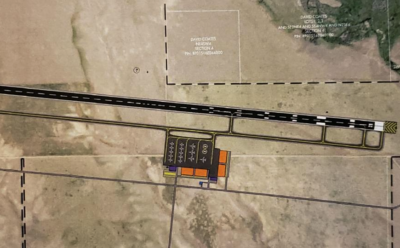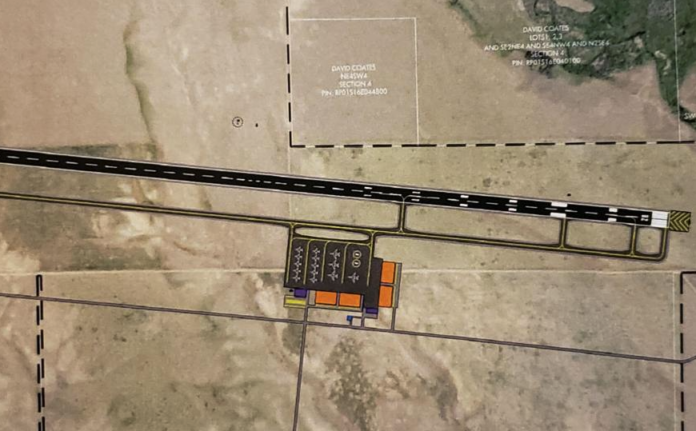By Eric Valentine

Residents of and around Fairfield were described by Camas County Planning & Zoning chairman Jerry Nelson as people who “only sleep here” in a report by the Idaho Mountain Express. But at least for some of them, their effort to mitigate the impacts of a private airport at Soldier Field will be die-hard.
“That was never the point,” said resident Kate Geiger, who opposes the airport. “The point is the people flying in here won’t be sleeping here.”
At issue is whether a private airport at Soldier Field should be allowed and, if so, how to best mitigate any negative impacts and optimize any economic opportunities. Camas P&Z commissioners gave the project their nod of approval Oct. 8 after rounds of deliberations by the developer—Ix-Nay Investment Trust—and objections by some residents.
To be clear, not all residents and business owners object to the 1,600-acre development that will construct—among other things—an 8,500-foot-long, 350-foot-wide runway that can handle commercial-size jets such as 747s. Some have publicly and privately stated that they see it as an opportunity for the small, agricultural community to grow a more vital economy and potentially become the epicenter of more affordable housing for working-class residents struggling to afford rents and mortgages across the Wood River Valley. They also figure it would create an uptick in tax revenue for an area not flush with public funds.
For residents like Leigh Weidman and Bob Rodman, the airport development feels like a done deal—and one done for the wealthy of the north Valley, not for the residents in the south. Why? It will be a private airport, for one thing, which has far less restrictions to navigate than its public counterparts—a “parking lot for Allen & Company and the Hailey airport,” as Weidman describes it. And for Rodman, who lives 1.5 miles from the site, the tax revenue argument is not backed up by the facts. Rodman says he researched the tax revenue of similar airports in the state and tax revenues were not even in the five-figure range.
Prepare For Takeoff
Soldier Field Airport still needs to get permission from the Camas County Board of Commissioners to move forward with the project. And to get their approval, developers will need to show they can and will adhere to certain guidelines set forth by a yet-to-be-completed report by Camas County building administrator Dwight Butlin. Once that report is filed, the commissioners will then take up the matter.
Since the development is a private one, it doesn’t necessarily trigger a public hearing. So that’s what residents like Weidman, Rodman and Geiger are focusing their energies on now.
“There are a number of issues that still need to be addressed,” Weidman said. “Hopefully, the county will see that it’s fitting to have a public hearing. And that’s when we have to make sure that if this airport gets developed, we make sure they’ve dotted all their i’s and crossed all their t’s.”
Alternative Routes
What’s disheartening for some of the opponents of the development is that for the most part they feel some deal has been cut behind closed doors and that their concerns have fallen on deaf or unwilling ears.
“I felt like they thought our concerns were real cute but they’ve already made up their mind,” recalled Rodman, a 22-year resident of Fairfield and 50-plus-year resident of the Valley, who said he attended all of the earlier sessions between the developers and P&Z.
Weidman said she went as far as drafting a housing development concept for leaders and developers to consider. It involved 60 single-family homes worth roughly $200,000 each that would generate $12 million a year in property tax revenue for the area.
“If we’re just a bedroom community, then let’s be an affordable one,” Weidman said. “But no one was interested.”



